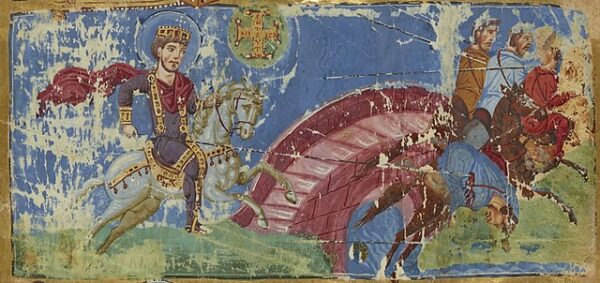July 25, 305, one of Rome’s most extraordinary emperors received a crown from his army, reshaping history for the centuries that followed. Born in Naissus, a city in the Balkans, Constantine The Great ascended to power during a critical period of the Roman Empire’s transformation. His reign marked a significant shift in the religious landscape, as he played a pivotal role in the empire’s conversion from paganism to Christianity.
“During the Crisis of the Third Century, the Roman Empire had suffered multiple difficulties: drought, famine, plagues, inflation, invading barbarians. Numerous Roman generals had fought over the rule of the empire, resulting in civil wars and the rule of the so-called barracks emperors who were chosen and often quickly replaced by the Roman army. When the dust cleared, Emperor Diocletian (r. 284-305) divided the empire into East and West and appointed co-emperors. Beneath the co-emperors, he appointed Caesars and Augusti to delegate Roman rule. Constantine’s father, Flavius Constantius, was one of the Caesars of the Western Roman Empire and was later elevated to Augustus. Diocletian then took the unprecedented step of retiring to his villa at Split (modern-day Croatia) in 306 CE.
When Constantius and his son battled the Picts in England, Constantius was killed near York in 306 CE, and the legions proclaimed Constantine Augustus on the field. With the retirement of Diocletian, the next several years saw civil wars in both the East and the West over who would become the sole ruler of the empire. Constantine’s opposition in the West was Maxentius and their armies met near the Milvian Bridge in Rome, a bridge across the northern outskirts on the Via Flaminia. Maxentius fell into the river (with his armor) and drowned. Constantine became the sole ruler in the West, writes the World History Encyclopedia.
One of Constantine’s most notable achievements was his military prowess and strategic acumen. He demonstrated exceptional leadership on the battlefield, culminating in his decisive victory over Maxentius at the Battle of Milvian Bridge in 312 AD. This triumph propelled him to the position of Augustus, a co-emperor, consolidating his authority in the Western Roman Empire.
“The night before meeting at the Milvian Bridge, Constantine prayed for success in the coming battle. Either in a vision or a dream, he saw an image with the script ‘In Hoc Signo Vinces’ (‘In this sign, conquer’). Controversy still swirls around both the event and the image that he saw.
We have two sources for the story: Eusebius (260-340 CE), Constantine’s court bishop, and Lactantius (Lucius Caecilius Caecilius Firmianus 250-325 CE), a court adviser and tutor to his sons. Both these men related the story, but only years after the event. Eusebius reported that Constantine saw the sign of the cross, while Lactantius said it was the superimposed letters chi and rho (the first two letters of ‘Christ’ in Greek). Whatever Constantine saw or experienced, he credited his victory to the Christian God.”
Constantine’s conversion to Christianity was a watershed moment in history. While the details of his spiritual journey remain a subject of scholarly debate, it is clear that he embraced Christianity and actively promoted its practice within the empire. The Edict of Milan in 313 AD, issued jointly with Licinius, granted religious tolerance to Christians and set the stage for the faith’s eventual ascendance.
In addition to his religious policies, Constantine’s administrative reforms significantly shaped the empire’s governance. He restructured the administrative divisions, known as dioceses, to foster more efficient management. Moreover, his relocation of the capital from Rome to Byzantium, which he renamed Constantinople, had far-reaching consequences, solidifying the city’s importance as a cultural and political center for centuries to come.
Constantine’s legacy endures beyond the borders of the Roman Empire. His impact on Christianity’s rise to prominence and the course of European history cannot be overstated. As a visionary leader, he navigated the complexities of a vast empire, leaving behind a transformative legacy that continues to shape our understanding of the ancient world and its enduring influence on contemporary societies.






